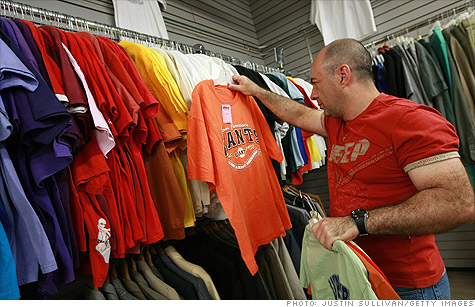Search News
 Soaring cotton prices could result in thinner T-shirts, '"fake" pockets and "poly-cotton" clothes hanging in stores near you this summer.
Soaring cotton prices could result in thinner T-shirts, '"fake" pockets and "poly-cotton" clothes hanging in stores near you this summer.
NEW YORK (CNNMoney) -- As cotton prices keep setting records, clothing sellers are challenged to do everything they can to avoid passing the cost on to shoppers. If they raise prices, they risk losing their customers.
But it's not easy for retailers to ignore the fact that cotton prices have more than doubled over the past year, hitting an all-time high of $2 a pound on Thursday.
Some companies are taking creative approaches to use less cotton.
"T-shirts may get thinner," said Chris Callieri, principal with A.T. Kearney's retail and consumer practice.
Callieri said some of his clients are playing around with the "density" of cotton fabric, to see how they can use less of it. "But you have to be careful with that approach so that it doesn't affect the quality of the garment," he said.
Another creative tweak is using "fake" pockets.
"You can reduce the size of a garment, but add embroidery and buttons. This can reduce cotton costs as well," Callieri said.
The cotton crunch is also bringing back the go-to fabric of the 70s, polyester.
But before you break into a sweat at the idea of shiny disco shirts and skin-tight trousers hanging at your neighborhood Macy's (M, Fortune 500) this summer, Callieri said retailers are experimenting with blended fabric, such as a poly-cotton mix, to replace pure-cotton offerings.
The cotton crunch is hitting the bedding and linen industry particularly hard since consumers generally favor 100%-cotton sheets.
"What has more cotton than the bedsheet that you slept on last night?" said Andrew Tananbaum, CEO of Capital Business Credit, which provides financing to suppliers who cater to bedding and clothing retailers in the U.S.
But companies are now warming up to using blended fabric.
Tananbaum said high thread count poly-cotton blended sheets are about 30% cheaper than comparable all-cotton sheets. The lower price could convince cotton purists to at least try the product and save some money.
"Instead of paying $100 for an 800-thread count all-cotton sheet set, you pay $70 for the same thread count." he said. "So it's cheaper, but the quality is still the same."
Another subtle way retailers will look to keep prices steady is by repackaging cotton products differently. While it won't seem like consumers are paying more, the repackaging will still come at some cost to them.
The most obvious example is with multipacks of cotton undershirts and socks that could shrink from five a pack to three a pack, said Marshal Cohen, chief retail analyst with NPD Group.
Ultimately, Cohen said the bottom line for consumers is that retailers can try to shield them from price increases through these methods but they won't be able to do it forever.
"No one knows when this trend is going to stop. Maybe the only thing that will stop it is if consumer demand for cotton items cools." said Phil Flynn, senior market and commodities analyst with PFG Best. ![]()






| Index | Last | Change | % Change |
|---|---|---|---|
| Dow | 32,627.97 | -234.33 | -0.71% |
| Nasdaq | 13,215.24 | 99.07 | 0.76% |
| S&P 500 | 3,913.10 | -2.36 | -0.06% |
| Treasuries | 1.73 | 0.00 | 0.12% |
| Company | Price | Change | % Change |
|---|---|---|---|
| Ford Motor Co | 8.29 | 0.05 | 0.61% |
| Advanced Micro Devic... | 54.59 | 0.70 | 1.30% |
| Cisco Systems Inc | 47.49 | -2.44 | -4.89% |
| General Electric Co | 13.00 | -0.16 | -1.22% |
| Kraft Heinz Co | 27.84 | -2.20 | -7.32% |
|
Bankrupt toy retailer tells bankruptcy court it is looking at possibly reviving the Toys 'R' Us and Babies 'R' Us brands. More |
Land O'Lakes CEO Beth Ford charts her career path, from her first job to becoming the first openly gay CEO at a Fortune 500 company in an interview with CNN's Boss Files. More |
Honda and General Motors are creating a new generation of fully autonomous vehicles. More |
In 1998, Ntsiki Biyela won a scholarship to study wine making. Now she's about to launch her own brand. More |
Whether you hedge inflation or look for a return that outpaces inflation, here's how to prepare. More |